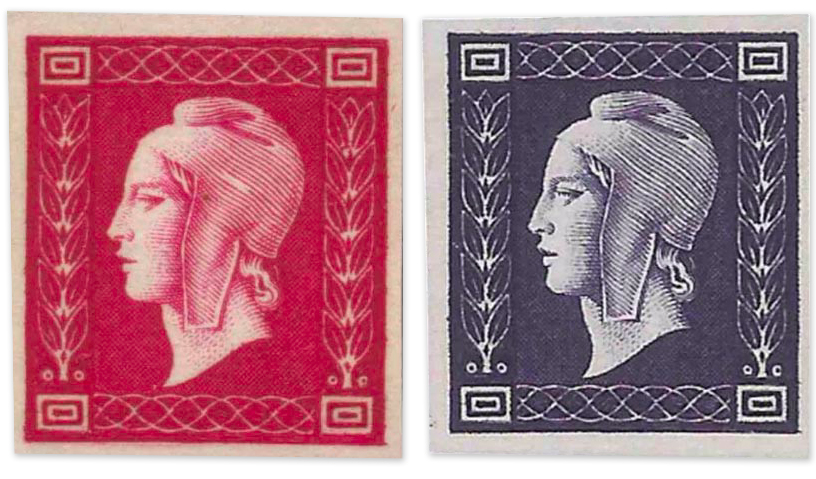Marianne De Dulac stamps, 1945 series
May 19, 2021
Views : 8436
French artist, Edmond Dulac (born in England in 1912) designed and created the stamp that was used in France and its colonies. These were also the stamp projects used in liberated France.
Dulac proposed a model representing Marianne for the first time, with the features of Léa Rixens, the wife of the painter Emile Rixens, who was his fellow student at the school of Fine arts in Toulouse.
Stamp manufacturing started on August 15, 1944, and the first boxes of stamps were shipped to Paris after August 31. On September 22, Tony Mayer, the head of the stamp service in London, noted that the 1F 50 pink Stamps put on sale in priority in France caused general admiration. However, since the postage stamp workshop had not suffered from the liberation battles and had resumed its work, Tony Mayer did not stop the printing of stamps in London but reduced it by half. The Dulac series ran from March to November 1945. The last sale of the biggest value, (50 F dark purple) raised fears in the Philatelic press as well as the appearance of a 100F and a 200F.
The legend and the value of this stamp were replaced by a "Greek", a frieze with regular motifs. The French postal administration would have wanted to prove by this draw that it was able to do as well as the English. In front of the cost price of the print, in bright colors, she does not follow up on this project.
Dulac proposed a model representing Marianne for the first time, with the features of Léa Rixens, the wife of the painter Emile Rixens, who was his fellow student at the school of Fine arts in Toulouse.
Non-issued
The first series of the three stamps corresponding to the pre-1942 postal rates was made in heliogravure by Harisson & Sons Printing House in London: a green 25c (for newspapers), a red 1F (for a single letter), and a blue 2,50 F (for the foreign letter). The printing method in gravure and the colors used are those of the English stamps with the effigy of George VI. This first series seems to have been printed in 5,000 copies but it was refused by General de Gaulle because of the legend "R France F".
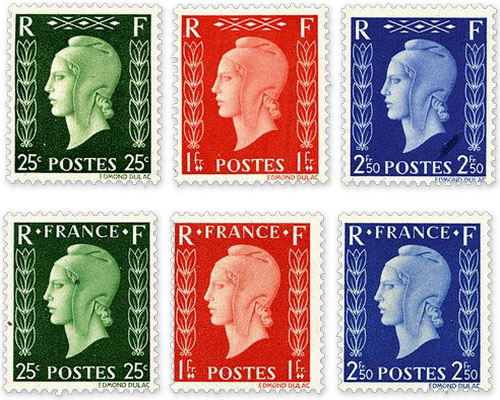
London's Dulac unissued draw
The definitive series
On 8 December 1943, the Colonies Commissioner instituted a competition in Algiers and decided to involve French artists, residing in Great Britain. He asked to draw inspiration either from themes already covered (the Republic effigy, Sower, Human Rights, etc.).

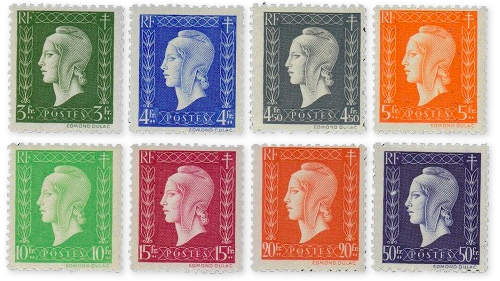
Stamp manufacturing started on August 15, 1944, and the first boxes of stamps were shipped to Paris after August 31. On September 22, Tony Mayer, the head of the stamp service in London, noted that the 1F 50 pink Stamps put on sale in priority in France caused general admiration. However, since the postage stamp workshop had not suffered from the liberation battles and had resumed its work, Tony Mayer did not stop the printing of stamps in London but reduced it by half. The Dulac series ran from March to November 1945. The last sale of the biggest value, (50 F dark purple) raised fears in the Philatelic press as well as the appearance of a 100F and a 200F.
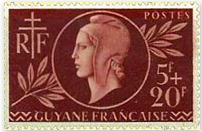
Dulac and banknotes
At the same time, 100F banknotes have been made, which would be used in liberated Corsica. Following the liberation of Corsica in September 1943, the CFLN decided to withdraw banknotes in service on the island. A 100F note designed by Dulac was then printed in Britain by Bradbury Wilkinson & Co, LTD. But the two 500F Brown and 1,000F Green Dulac banknotes were put into circulation in 1945 in France. On the 500F note, Marianne looks to the right, unlike other banknotes and stamps. A 5,000F note remains unissued.
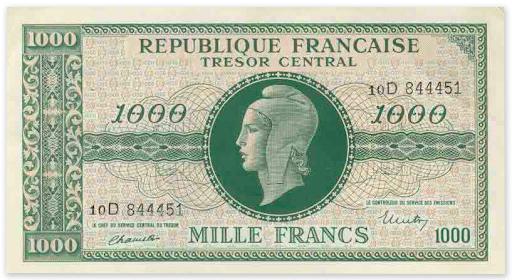
Banknote 1000 Francs Dulac
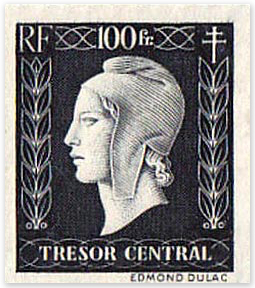
Vignette 100 Francs Dulac
Marianne De Dulac, Paris
At the request of the French Government, a so-called “de Paris" printing was carried out by the “Atelier des Timbres-Poste”, from 7 May to 9 August 1948 (sheets of 50 stamps, in fifteen different shades).The legend and the value of this stamp were replaced by a "Greek", a frieze with regular motifs. The French postal administration would have wanted to prove by this draw that it was able to do as well as the English. In front of the cost price of the print, in bright colors, she does not follow up on this project.
